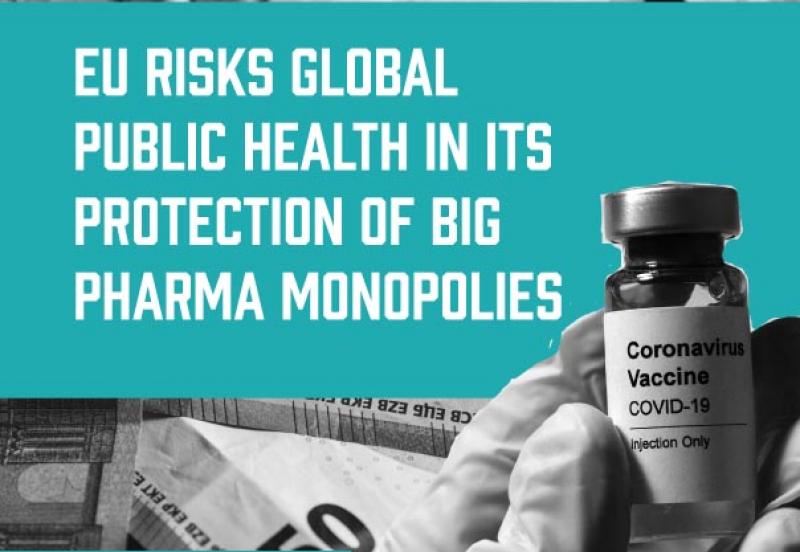
The EU is playing a dirty game in WTO vaccines-talks
The European Commission and some EU-member states are playing dirty in the WTO-debate on patents and accessCovid-19 vaccines. That is shown today by new research of lobby-watchdog Corporate Europe Observatory (CEO).
While EU top-officials still claim that vaccines should be “a common good”, they use false arguments when defending their resistance against the proposal for a waiver on intellectual property rights (1) on all COVID-19 products under WTO-rules (TRIPS Agreement). This proposal to speed up notably covid-19 vaccines production was put on the table by India and South-Africa with the support of a high number of other countries. But itis being brushed of the table by the EU-bloc and other rich countries. This week there will be new WTO-negotiations in Geneva on the issue of the TRIPS-waiver, whereby the EU has the power to make or break the proposal (2).
The European Commission claims that there is no need for such a waiver because the current TRIPS Agreement already “allows exceptions” to make space for ‘compulsory licensing’ in times of emergency. But based on CEO-research into trade agreements, EU-accession agreements and IP enforcement reports, it is clear that the EU has done the opposite: It has done everything in its power to strengthen patent rules and making flexibility of deviating from WTO-rules basically impossible .
The European Commission has waged a multifaceted, non-stop, global campaign to reduce the scope of the so called flexibility, hand in hand with EFPIA, the European lobby-group for the pharmaceutical industry. By constant pressure in any possible context, the EU has for instance pushed for introduction of rules on “data exclusivity” in trade agreements. (3).
These ‘data exclusivity’ provisions prevent generic producers in the South from making use of the exceptions under the TRIPS agreement. Furthermore, there is plenty of evidence to suggest that even if the EU had not worked hand in hand with the pharmaceutical lobby to systematically undermine the exceptions, they would not suffice in the current situation.(4)
Kenneth Haar, researcher at Corporate Europe Observatory said:
“The refusal by the EU to agree with the TRIPS waiver is irresponsible behaviour. In light of the role of the EU in the trade negotiations in the past decades, the arguments used now by the EU are simply hypocritical. The richest trading bloc in the world has been waging a ‘war on accessible cheap drugs’ globally for over two decades or more. In that sense the covid-19 vaccines showed the EU learned nothing from the debate on access to HIV-medicines.”
“The EU’s protection of Big Pharma monopoly on vaccines could have dire consequences for protecting people in the Global South and for curbing this pandemic (5). Charity via initiatives as Covax (6) may be heart warming, but they are not a credible policy strategy. We need to boost production through speedy licensing and sharing of technology. This is not the time to worry about patents on vaccines that only saw the light of day due to public funding anyway.”
ENDS
Notes to the Editor:
- The proposal by India and South Africa for a waiver on intellectual property rights: https://docs.wto.org/dol2fe/Pages/SS/directdoc.aspx?filename=q:/IP/C/W669.pdf&Open=True
- The EU carries a decisive responsability to make sure the Global South has a fair chance of having acces to enough covid-19 vaccines. The WTO TRIPS Council (all EU member states represented) are to decide what to recommend to the General Council concerning the proposal by India and South Africa. The latter will have the final word in a limited period that can be used to consider a waiver. If the proposal cannot be adopted by unanimity by the TRIPS Council, 75% of the votes will suffice. But with 27 EU votes against, that is not possible. If the EU were to support the waiver, it might pass.
- For a pharmaceutical company to have its product approved by the authorities, they have to hand in considerable data about it, not least they have to put the results of lengthy and expensive tests to scrutiny by public health authorities. Few generic companies, if any, have the capacity, the apparatus, do produce these data. When the EU, then, asks other governments to make sure that health authorities keep those data confidential for years – the “data exclusivity” - then it is impossible in most cases to make use of a compulsory license during that time.
- As Ellen ’t Hoen, expert in medicines law puts it in the CEO-review: “Compulsory licensing will not help in the case of vaccines. Generic producers will need access to technology, they will need to have information on production processes. That is not covered by the current exceptions.”
- https://www.globaljustice.org.uk/news/2020/dec/9/campaigners-warn-9-out-10-people-poor-countries-are-set-miss-out-covid-19-vaccine: Campaigners warn that 9 out of 10 people in poor countries are set to miss out on Covid-19 vaccination in 2021.
- https://www.opendemocracy.net/en/what-can-people-in-wealthy-nations-do-to-fix-covid-vaccine-apartheid/ : The WHO director-general, Dr Tedros Adhanom Ghebreyesus, told the body’s recent executive board that 44 bilateral deals had been done in 2020 and a further 12 this year. Canada, for example, has pre-ordered nine doses per citizen. The US has pre-ordered 7.3 doses per citizen and the UK 5.7. “Even as they speak the language of equitable access, some countries and companies continue to prioritize bilateral deals, going around COVAX, driving up prices and attempting to jump to the front of the queue. This is wrong,” said Tedros.
